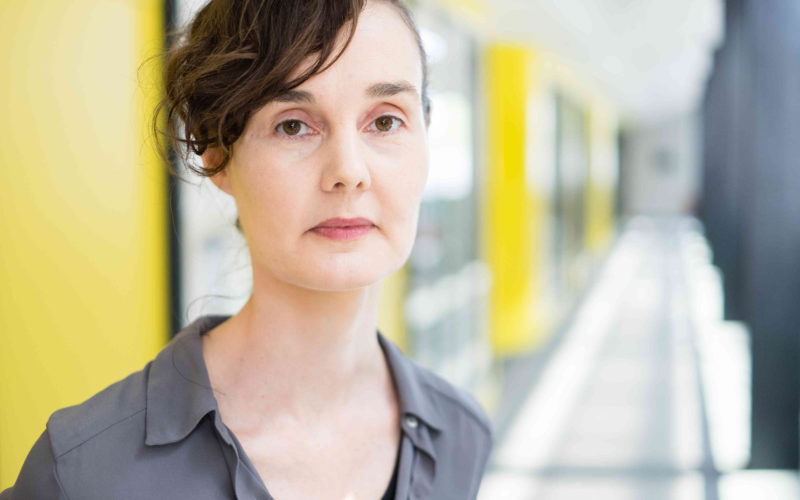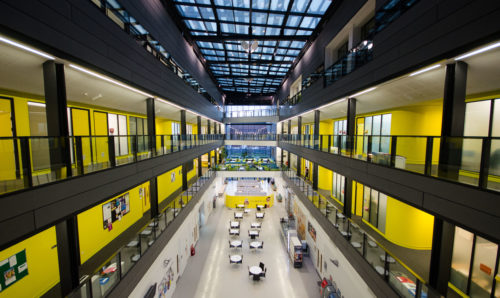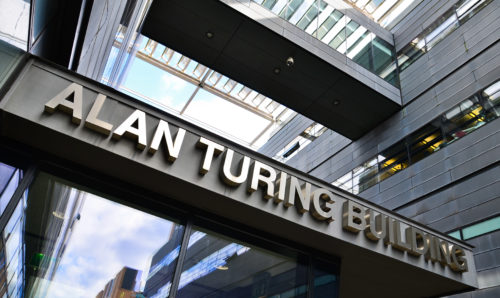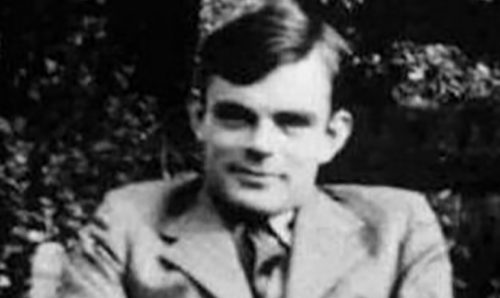Meet our academics – Dr Catherine Powell
Meet the Department 12th February 2019
In this series of blogs, we chat to the academics you’ll meet, be taught by and work with during your time in the School of Mathematics. In this post, we catch up with Reader in Applied Maths and Numerical Analysis Dr Catherine Powell and ask about her research in Numerical Analysis.
Please can you describe your research, for the layperson, in 10 sentences or less?
My research can be categorised as Numerical Analysis, which is basically the science of approximation. Numerical analysts develop numerical methods (or algorithms) for approximating solutions to problems that can’t be solved exactly. We study the properties and performance of numerical methods. This might sound a bit boring, but understanding how numerical methods behave is extremely important. Scientists embed numerical methods inside codes to solve models to do all sorts of things, e.g. to understand fluid flows, the behaviour of viruses, to predict the weather, natural disasters, the climate, to help us to construct buildings and bridges, to manufacture aircraft and cars etc. If we don’t understand how accurate the methods used are, then we can’t have confidence in the results. Anyone can run a code, produce some numerical results and plot a pretty picture. The tough question is, can we trust those results? These days, I mainly work in the field of Uncertainty Quantification (UQ). Here, we try to understand how to deal with mathematical models with uncertain features and develop numerical methods for predicting quantities of interest in the presence of uncertainty. This is a really exciting interdisciplinary field at the interface of applied mathematics, numerical analysis, probability and statistics.

What do you most enjoy about working here at The University of Manchester?
Working in Manchester can be challenging. The University is big, there are a lot of people and it can feel noisy and crowded at times. However, the people are friendly and the staff in the School of Mathematics are always willing to help. Having professional and enthusiastic colleagues makes this an enjoyable place to work. Manchester as a city is very diverse culturally, which I like, and there are always lots of interesting things to do and see. I also like the fact that the University is centrally located, only 10 mins from the city centre with very easy access to public transport, shops, theatres, restaurants etc.
Who or what first inspired your interest in Mathematics?
I don’t think I understood what mathematics really is until I went to University. When I was little, I certainly always liked numbers. I had quite a few Rubik’s puzzles and like many children of the 80s, had a toy called a Little Professor which helped you practise doing sums. I loved that. At School, in maths classes, I remember having to do pieces of coursework called ‘investigations’. We’d be given a problem and had to go off and investigate how to solve it on our own and write up what we’d found. I really liked doing those. Now, my job is doing investigations all the time.
What were you doing before coming to The University of Manchester?
I’m actually half-Mancunian but did not grow up here. I came to Manchester as a student to study Mathematics and French at UMIST. In those days, there were not many places where you could combine mathematics with a language, and I really wanted to do that. After spending a year working abroad doing an office-based job in the finance sector, I realised I wasn’t using mathematics. I missed it. At UMIST, I saw a poster advertising scholarships for an MSc programme in Numerical Analysis and Computing. I liked the sound of doing something ‘practical’ so I applied. After the MSc, I did a PhD and then I got a job here as a lecturer. So, I’ve been at Manchester a long time!
What do you like to do when you’re not working?
I prefer the countryside to the city, so I like hiking and being outdoors. However, being an academic is not like having a 9-5 job. It’s part of who you are, not just what your job title is. Even when we’re at home, we’re often thinking about our research (especially if we’re stuck on a proof, or our numerical results are doing something weird) and coming up with new ideas. It can be hard to switch off.
We’ll have a new academic interview for you on the blog soon.
alan turing buildingmathsmeet our academicsnumerical analysis




